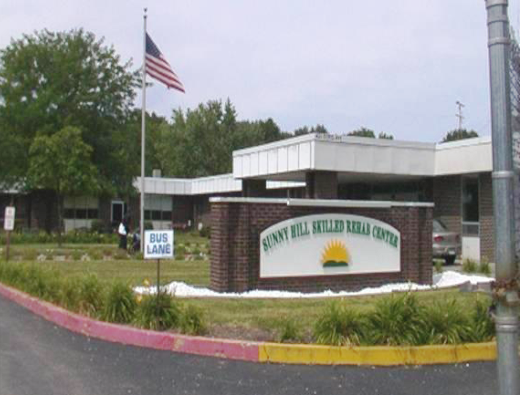Sunny Hill Nursing Home
Sunny Hill Nursing Home of Will County (SHNH) is a full service,’ skilled nursing facility, certified by Medicare and Medicaid services, which is owned and operated by Will County. Constructed in 1969, this 137 room, 238 bed, ~131,400 square foot facility provides nursing and residential services 24 hours per day, 7 days per week to support Will County’s rapidly growing geriatric population. SHNH of Will County’s mission is to provide the highest quality resident-centered care possible. This mission is practiced every day as 99% of SHNH’s population has no discharge potential, and the average resident age is 87 years old.
Some of the additional improvements include:
-
New court yard addition with LED lighting and wheel chair friendly garden beds
-
LED and induction lighting outside
-
LED interior lighting in all of the avenues and some common and office spaces
-
Low-e windows that prevent heat gain during cooling months
-
A revolving door at the main entry that decreases air exchange year-round
-
A partial reflective roof coating that reduces cooling demands in warmer months
SHNH has seen massive renovations in the last 10 years that contribute to the mission of SHNH and more efficient operations that reduce energy and water demand and save costs.
Interior Lighting Retrofit (2014)
In March 2014, SHNH retrofitted a significant portion of the facility’s interior lighting, reducing the number of fixtures in the areas retrofitted by nearly 21%. Total kWh savings for this retrofit, assuming a 16-hour per day burn time 7 days per week, are 56,457.86 kWh annually resulting in approximately $3,884.30 per year.
Assuming the useful life of these fixtures are ~100,000 burn hours, the lifetime energy savings are:
~969,400.07 kWh resuting in approximately $66,694.72.
This project cost is estimated at minimum ~$20,000.00. This project was incentivized at $15,002.80 by the Illinois Department of Commerce and Economic Opportunity’s (DCEO’s) Illinois Energy Now (IEN) Public Sector Energy Efficiency (PSEE) Program.
County Receives Revenue through Demand Response Program
Since 2019, Will County has received an annual payment for using a generator at the Sunny Hill Nursing Home to curtai energy usage as part of a “Demand Response Program.” This program offers an incenive to businesses to unplug from the grid during high demand times. In this case, the County takes Sunny Hill Nursing Home “off grid” during peak demand usage hours, but meets energy needs with generator.
At the beginning of 2018 the County was approached by a couple of vendors advertising demand response opportunities. After several months of negotiation, the County chose the one deemed best able to work with the County to set up the program successfully. A nursing home typically has a generator to protect patients in the event of a power outage. In order to make sure that the generator at Sunny Hill was in good standard, it had to apply and pass for an emissions permit from the Illinois Environmental Protection Agency, since the generator runs on diesel. Once that all was taken care of, there was further planning and execution of the program.
Typically, when one participates in a demand response program, there are different ways you can lower your “peak load”. The first, is taking off the load you typically use, and you switch that usage using a generator. Normally, generators are in place at critical buildings, in case there is a power outage or some other time of emergency, where it is essential that the building must still run. Sunny Hill, is a 24/7 facility, that has lots of critical care medical equipment, so it always needs a constant power supply. The converted peak load, is usually on the generator for an hour, and this “test” is typically asked to complete once a year. Another way you can do the demand response, is by a method called “powering down”. This method, is when you do not use a generator, but instead, you turn the air conditioning very low, and then turn it off, during the hour asked to power down. In some cases, if the warning is not too far in advance, then sometimes for time purposes, the air conditioning gets shut off, however, by the time it gets too warm, that hour has passed and the air conditioning gets turned back on.
Between the end of 2019, and early 2020, Will County was approached once more by different demand response vendors, in participation with the “power down” method. There were a couple more buildings where it was found feasible to participate in this fashion, and a new contract was signed.
Just by participating in the Demand Response program once a year, a check gets sent to Will County. These checks get put into the “Capital Equipment/Replacement Fund”, which is a fund/account that Will County created in 2016. Any incentive check that we receive through energy efficiency projects or
Parking Lot Retrofit (2019)
At the end of 2019, there was a parking lot retrofit, switching metal halide fixtures to LED ones. This is not only more energy efficient, but has more illuminating power, providing a safer and well-lit parking lot.